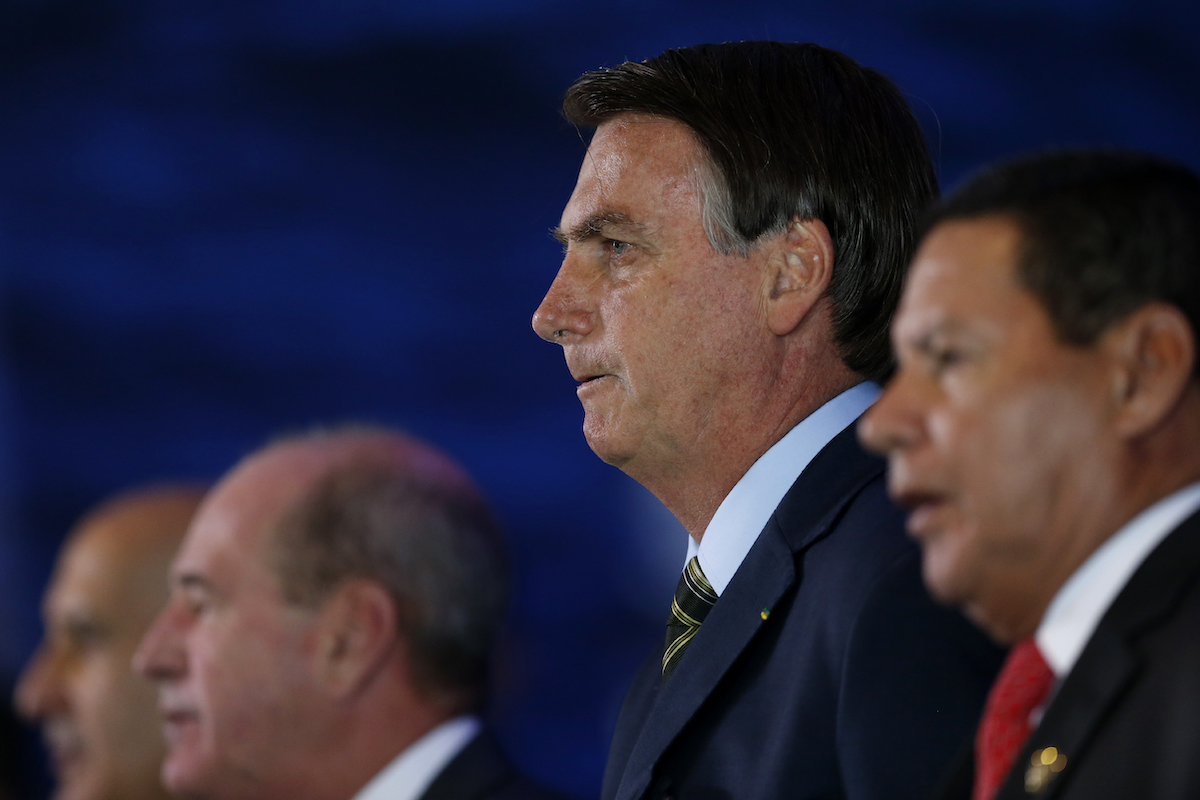

Brazil’s President Jair Bolsonaro, second right, next to Vice President Hamilton Mourao, attend a lunch with Armed Forces General Officers in Brasilia, Brazil, Monday, December 9, 2019. (AP Photo /Eraldo Peres)
By DIANE JEANTET, Associated Press
RIO DE JANEIRO (AP) — The states of Brazil’s Amazon region held talks Wednesday with Norway about possibly receiving some $500 million in funding for sustainable rainforest projects, if a deal to provide the funds at a federal level falls through.
The $500 million had been earmarked for Brazil’s Amazon Fund, created in 2008 to receive donations for projects that help contain deforestation. But Norway disagrees with the changes Brazil’s Environment Minister Ricardo Salles has proposed for the fund, and the money remains “frozen” pending a possible agreement the press officer for Norway’s Environment Ministry, Jo Randen, told The Associated Press.
But the nine states of Brazil’s Amazon hope to receive that money directly if no federal agreement is reached, according to Amapa state Gov. Waldez Góes, who met with Norway’s Climate and Environment Minister Ola Elvestuen on Wednesday at the U.N.’s climate conference.
“If they [the national governments] can’t resolve their disagreement, they have to think about mechanisms like ours,” said Góes, who leads the consortium of states, in a phone interview from Madrid.
The talks with Norway are part of a broader effort by Amazonian states to develop direct contact with donating countries at a time when the willingness of President Jair Bolsonaro’s administration to fight deforestation faces growing international skepticism.
In addition to Norway, the governors also held talks with representatives from Germany, which this year suspended environmental funding, as well as France, the U.K. and the U.S., Góes said.
An annual report from Brazil’s space research institute released last month showed deforestation in the Amazon was at its highest level in more than a decade. Deforestation in the region increased by nearly 30 percent in the year through July as compared to the 12-month period.
Foreign leaders have also frowned upon Bolsonaro and his far-right administration repeatedly attacking academics, experts and nonprofits working to protect the environment.
Bolsonaro, a former army captain, suggested without offering any evidence that nonprofits were behind some of the fires that broke out in the Amazon in July and August, as a means to make his administration look bad. He later claimed that U.S. actor Leonardo DiCaprio, by funding certain nonprofits, was partly responsible for the blazes. DiCaprio denied funding those groups, but expressed solidarity with them.
In April, the president issued a presidential decree that dissolved dozens of committees, in which nonprofits, experts and civil society members had played a significant role. One was the Amazon Fund Guidance Committee, which had set criteria for project selection and fund allocation.
One of the key points of the negotiations between the two countries to unblock the $500 million in donations is organization of a new governing committee, with Brazil’s Environment Minister Ricardo Salles pushing for more government oversight.
State governors in the Amazon have sought to distance themselves from the government’s criticism and incendiary comments, presenting themselves as “unconditional defenders” of the fund and the environment.
“We try to get away from this negative agenda,” Góes said. While he hopes Brazilian officials will find a solution to the fund’s current paralysis, he said Amazonian states must be ready to step up and offer an alternative.
The idea of a consortium of Amazonian states is two years old, pre-dating Bolsonaro’s election, but its legal status and ability to receive foreign funding without federal approval were established this year.


